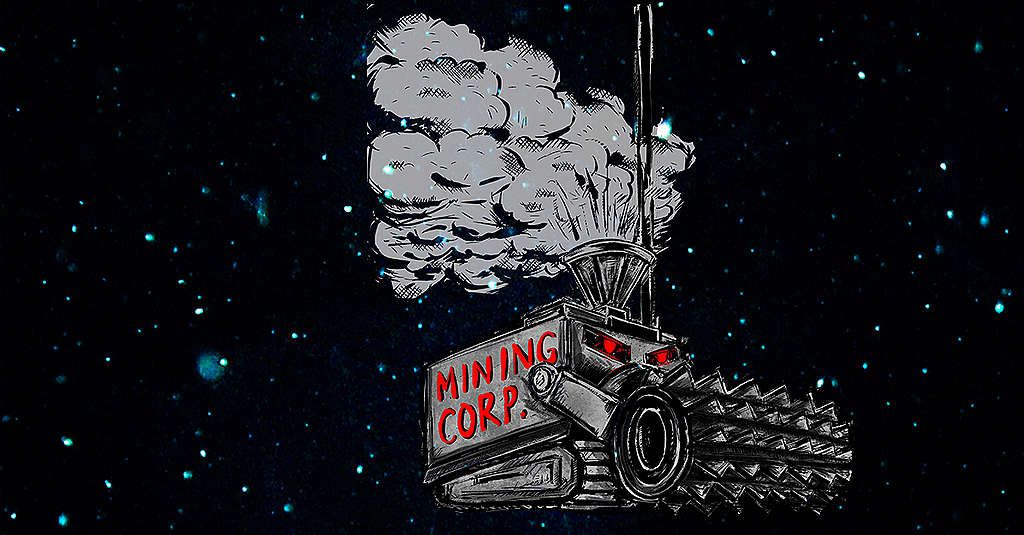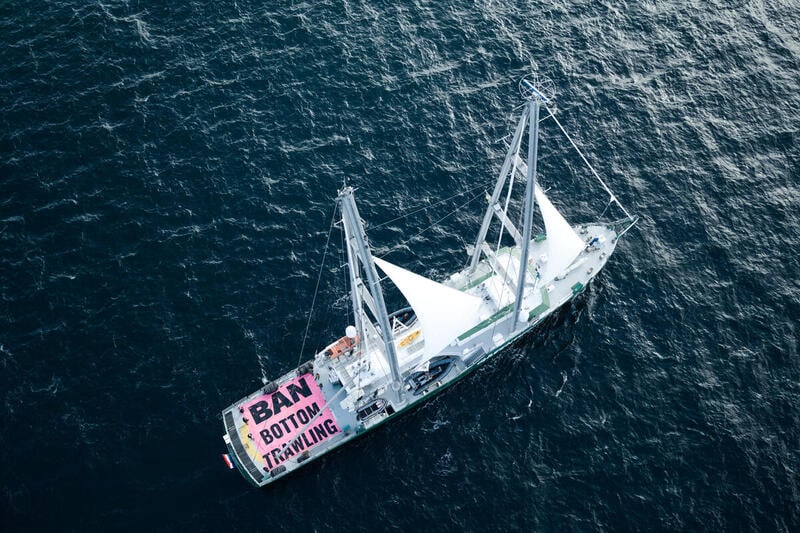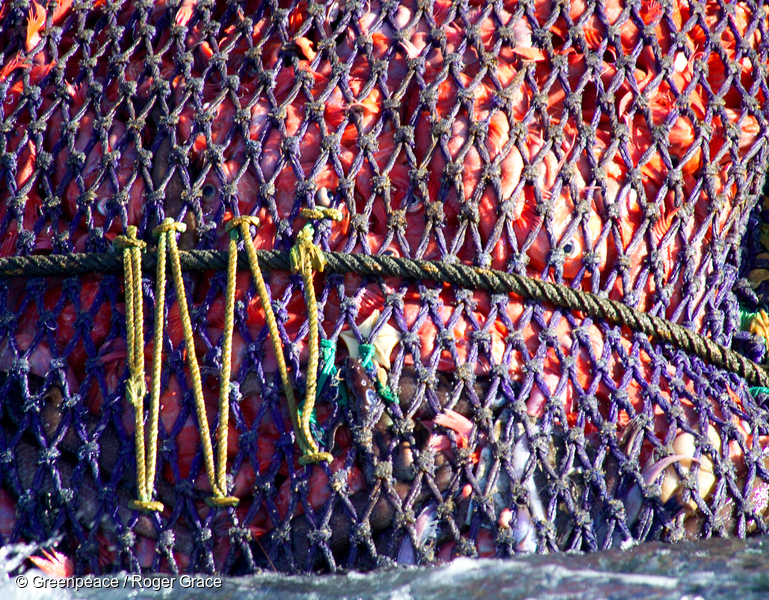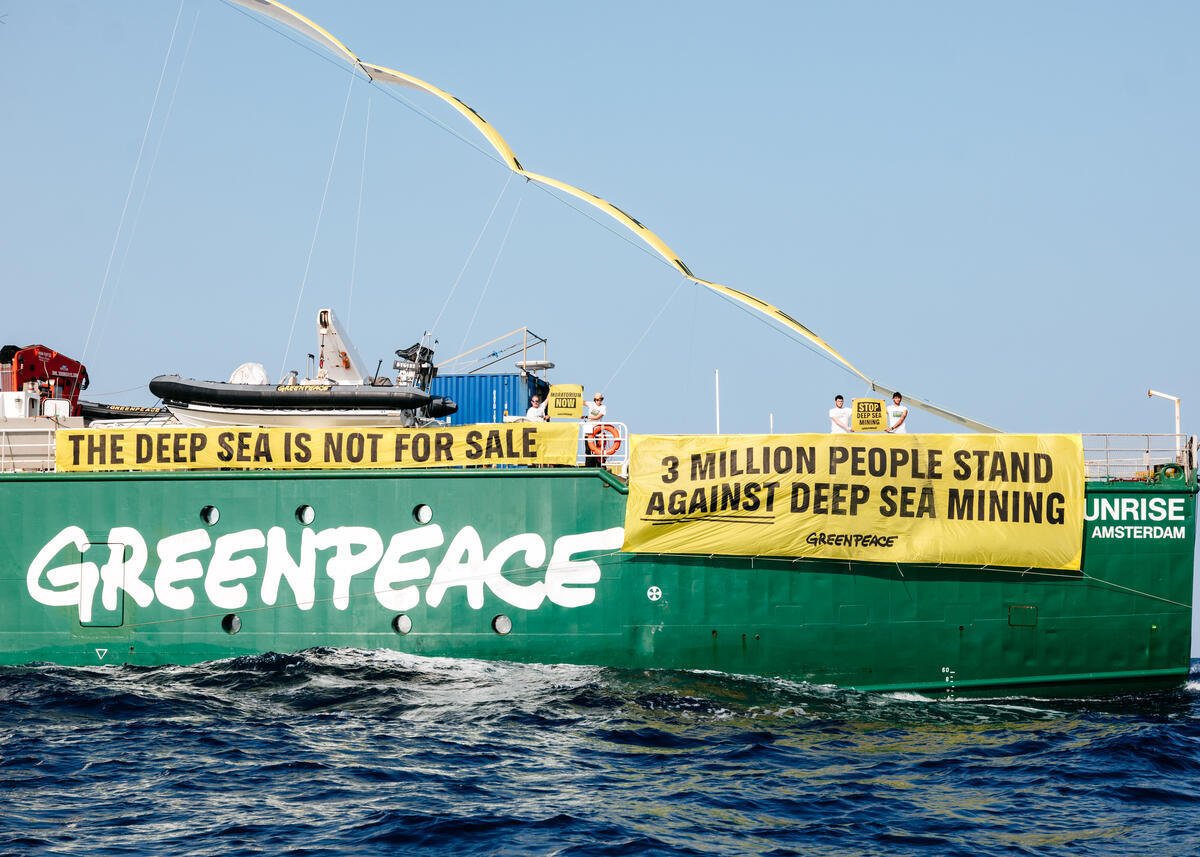Eastern Pacific Ocean – Greenpeace International activists yesterday began an ongoing peaceful action against a ship doing deep sea mining exploration for The Metals Company (TMC), to denounce the imminent threat that this industry poses to the world’s oceans. Under pouring rain and on kayaks launched from Greenpeace ship the Arctic Sunrise, they paddled and protested around MV COCO, a specialised offshore drilling vessel currently collecting data for TMC to file a mining permit.
Activists from Mexico, Argentina, Norway, South Korea, Poland and the UK rotated to carry out a non-stop paddling activity that disrupted TMC’s plans from daybreak to sunset. They carried banners with the message “Stop Deep Sea Mining”.
On board the Arctic Sunrise, Greenpeace International campaigner Louisa Casson, says, “Greenpeace International has followed this reckless industry to the area at the heart of the deep sea mining debate, taking peaceful action to defend these precious ecosystems. The Metals Company is determined to ignore science, good sense and global public opposition to mine in the world’s last untouched frontier, but we are here to call out this dangerous industry and let them know that deep sea mining won’t start on our watch.”
The action, which will continue in the coming days, is taking place in a part of the Pacific Ocean called the Clarion Clipperton Zone (CCZ) — an area between Mexico and Hawaii — where the deep sea mining industry is conducting one of the final expeditions before filing the first ever application to commercially exploit the international seabed, despite growing political opposition. In keeping with Greenpeace practice, this protest was conducted in a safe, peaceful and controlled manner by trained activists. The activists repeatedly informed the captain of their peaceful intentions prior to beginning the protest and maintained contact throughout. The Arctic Sunrise will remain on site to protest and bear witness to the industry’s movements in the coming days.
In June 2021, The Metals Company made use of a legal loophole in international law to try and force Governments’ hands to allow deep sea mining to begin, despite unresolved negotiations at the International Seabed Authority (ISA). After governments did not give deep sea mining the greenlight in July, TMC announced that they will submit a deep sea mining commercial application next year, even in the absence of any regulations and despite there are now 24 countries calling for a moratorium, with Mexico joining the list on Tuesday.
Greenpeace Aotearoa campaigner James Hita, who also confronted The Metals Company at sea in the Pacific in November 2022, says, “The Metals Company has cynically attempted to subvert a democratic process and push countries into accepting commercial-scale deep sea mining before sufficient science is available to make an informed decision. The international seabed and seas are the common heritage of humankind and should not be left to the mercy of greedy companies seeking to enrich a few to the detriment of us all.”
“Deep sea mining is a significant threat to the health of the ocean, which is essential to the Pacific way of life and one of our biggest allies in the fight against the climate and biodiversity crises. We cannot stand by while deep sea mining companies seek to plunder the seafloor and decimate biodiversity for profit.”
Over 30,000 people have signed a petition calling on the New Zealand Government to support a global ban on deep sea mining. The Labour-led government backed a “conditional moratorium” on seabed mining in international waters, a move which Greenpeace Aotearoa applauded but urged for an even stronger position.
Photos and Videos can be accessed from the Greenpeace Media Library.
Notes
MV COCO arrived in the NORI-D licence area on the 16th of November, where TMC has carried out several expeditions since the ISA granted NORI, a wholly-owned subsidiary of TMC sponsored by the small Pacific Island of Nauru, an exploration contract in 2011. It is one of the three sites in the Pacific Ocean controlled by Canadian-registered The Metals Company. TMC carried out the first deep sea mining test done since the 1970s in this area and returned to port a year ago after extracting 4,500 tonnes of polymetallic nodules.

It’s time for New Zealand to take a stand. Join our call on the New Zealand government to back a global moratorium on seabed mining.
Take Action


